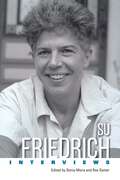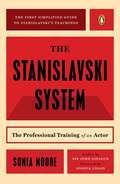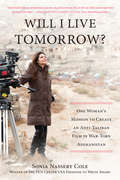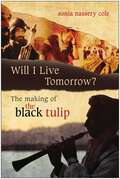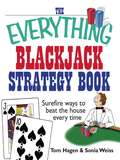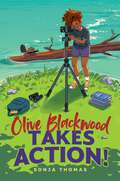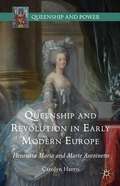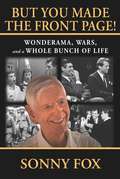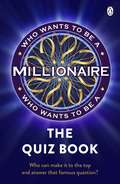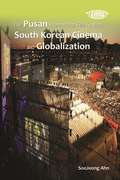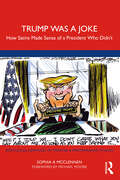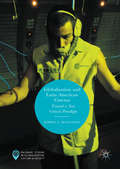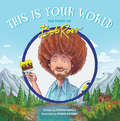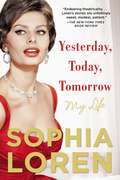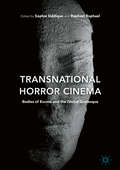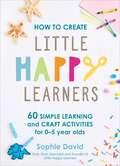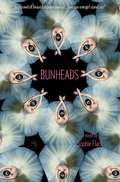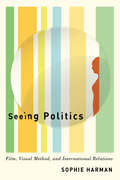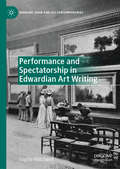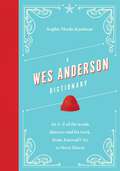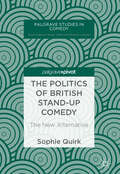- Table View
- List View
Su Friedrich: Interviews (Conversations with Filmmakers Series)
by Sonia Misra and Rox SamerSu Friedrich (b. 1954) has been described as an autobiographical filmmaker, an experimental filmmaker, a documentary filmmaker, an independent filmmaker, a feminist filmmaker, and a lesbian filmmaker—labels that she sprucely dodges, insisting time and again she is, quite simply, a filmmaker. Nevertheless, the influences of the experimental film culture and of the feminist and lesbian political ethos out of which she emerged resonate across her films to the present day. Su Friedrich: Interviews is the first volume dedicated exclusively to Friedrich and her work. The interviews collected here highlight the historical, theoretical, political, and economic dimensions through which Friedrich’s films gain their unique and defiantly ambiguous identity. The collection seeks to give a comprehensive view of Friedrich’s diverse body of work, the conditions in which her films were made, and how they have circulated and become understood within different contexts. The volume contains fifteen interviews—two previously unpublished—along with three autobiographical writings by Friedrich. Included are canonical early interviews, but a special focus is given to interviews that address her less-studied film production in the twenty-first century. Echoing across these various pieces is Friedrich’s charmingly sardonic and defiant personality, familiar from her films. Her occasional resistance to an interviewer’s line of questioning opens up other, unexpected lines of inquiry as it also provides insight into her distinct philosophy. The volume closes with a new interview conducted by the editors, which illuminates areas that remain latent or underdiscussed in other interviews, including Friedrich’s work as a film professor and projects that supplement Friedrich’s filmmaking, such as Edited By, an online historical resource dedicated to collecting information about and honoring the contributions of women film editors.
The Stanislavski System: The Professional Training of an Actor
by Sonia MooreAn overview of Konstantin Stanislavski and his instruction of his acting method, now known among actors simply as "the method."
The Stanislavski System: The Professional Training of an Actor; Second Revised Edition
by Sonia MooreThis clearly written guide to the Stanislavski method has long been a favorite among students and teachers of acting. Now, in light of books and articles recently published in the Soviet Union, Sonia Moore has made revisions that include a new section on the subtext of a role. She provides detailed explanations of all the methods that actors in training have found indispensable for more than twenty years. Designed to create better actors, this guide will put individuals in touch with themselves and increase personal sensitivity as well. .
Will I Live Tomorrow?
by Sonia Nassery ColeWhen Sonia Nassery Cole set out to film The Black Tulip in her homeland of Afghanistan, she knew the odds were against her; she was told time and time again that filming inside a war zone would be impossible. What she didn't anticipate was how intent the Taliban and its sympathizers were on halting the film's production-the crew encountered extortion, government corruption, kidnapping attempts, and death threats, even with around-the-clock security. Her cinematographer fled after two days, and many others followed.After 9/11, Cole wrote The Black Tulip, based on a true story of a real Afghan family. The plot was simple: After 2001, when the Taliban was routed, an Afghan family opened The Poet's Corner-a restaurant with an open microphone for all to read poetry, perform music, and tell their stories. But the Taliban didn't approve, and the family's new-found hope proved fleeting as it struggled to maintain the restaurant and its vibrant way of life. Selected as Afghanistan's official submission for the Best Foreign Language Film at the 2010 Academy Awards, The Black Tulip is a modern portrait of Afghanistan that captures the plight and resilience of its people.Without financial support from a studio or anyone else, Cole self-financed the film by mortgaging her home and selling her belongings. Then, with everything on the line, she left for Kabul to make the impossible possible and set out to gather the right people who would risk their lives and willingly be part of the production.In Will I Live Tomorrow?, Cole gives an intimate look into what went on behind the scenes of making a controversial film in the heart of a war-ravaged country-the looming terror the Taliban creates among Afghans everywhere and the challenges and fear the cast and crew faced every day.Will I Live Tomorrow? is a memoir about one woman's struggle to make a difference in a violent world.
Will I Live Tomorrow?: The Making of The Black Tulip
by Sonia Nassery ColeWhen Sonia Nassery Cole set out to film The Black Tulip in her homeland of Afghanistan, she knew the odds were against her; she was told time and time again that filming inside a war zone would be impossible. What she didn't anticipate was how intent the Taliban and its sympathizers were on halting the film's production—the crew encountered extortion, government corruption, kidnapping attempts, and death threats, even with around-the-clock security. Her cinematographer fled after two days, and many others followed. After 9/11, Cole wrote The Black Tulip, based on a true story of a real Afghan family. The plot was simple: After 2001, when the Taliban was routed, an Afghan family opened The Poet's Corner—a restaurant with an open microphone for all to read poetry, perform music, and tell their stories. But the Taliban didn't approve, and the family's new-found hope proved fleeting as it struggled to maintain the restaurant and its vibrant way of life. Selected as Afghanistan's official submission for the Best Foreign Language Film at the 2010 Academy Awards, The Black Tulip is a modern portrait of Afghanistan that captures the plight and resilience of its people. Without financial support from a studio or anyone else, Cole self-financed the film by mortgaging her home and selling her belongings. Then, with everything on the line, she left for Kabul to make the impossible possible and set out to gather the right people who would risk their lives and willingly be part of the production. In Will I Live Tomorrow?, Cole gives an intimate look into what went on behind the scenes of making a controversial film in the heart of a war-ravaged country—the looming terror the Taliban creates among Afghans everywhere and the challenges and fear the cast and crew faced every day. Will I Live Tomorrow? is a memoir about one woman's struggle to make a difference in a violent world.
Blackjack Strategy Book (The Everything )
by Tom Hagen Sonia WeissExpert player Tom Hagen and author Sonia Weiss guide you through the basic rules, and reveal the surprisingly easy tricks the casinos don't want you to know. Whether you're counting cards or doubling down, you'll master the intricate techniques you need to win-putting the odds in your favor every time!The Everything Blackjack Strategy Book includes:Complete rules for blackjack and its many variationsBasic and complex strategies including surrendering, entering early, and insurance Tips for playing onlineTricks for understanding odds and probabilityGuidelines for casino etiquetteHints for tournament playWhether you're an amateur or a pro, The Everything Blackjack Strategy Book will give you the advantage, skill, and confidence you need to beat the house every time!
Olive Blackwood Takes Action!
by Sonja ThomasAn anxious aspiring filmmaker bands together with an unlikely friend group to protect their beloved state animal in this heartwarming contemporary middle grade novel perfect for fans of Jamie Sumner and Erin Entrada Kelly.Twelve-year-old Olive Blackwood&’s dream is to direct blockbuster fantasy movies, just like her dad wanted to before he died. She decides to apply to the highly competitive Rose City Summer Film Camp with the help of her best friend, Kayla. But Olive isn&’t sure how she can cast the movie when the mere thought of talking to a stranger makes her nervous. Then a surprise project in Olive&’s film class presents her best chance at going to Rose City: the group who makes the best documentary trailer will receive a recommendation to the elite program! But Olive&’s hopes are quickly dashed when she&’s paired with the two worst students in class: loud Jo Willems has a flashy style of dressing just as intimidating as their outspoken opinions and David Moore is even quieter than Olive, fading into the background. It seems impossible for the three of them to find enough common ground to produce something noteworthy. When Olive stumbles across an old lady chasing a beaver with a frying pan, she&’s disturbed to discover it&’s legal to kill beavers in Oregon—which has the animal on the state flag! Olive posts the video she took of the incident, and it goes viral. She wants to raise more awareness, and if she uses her documentary to do it, she could even get the coveted Rose City recommendation at the same time. With the help of unexpected friendship, counseling, and a little everyday magic, can Olive make her voice be heard?
Digital Identity and Everyday Activism: Sharing Private Stories With Networked Publics (Palgrave Studies in Communication for Social Change)
by Sonja VivienneThis book reinvigorates the space between scholarly texts on self-representation, voice and agency and practical field-guides to community media and digital storytelling. It offers reflection on the ethical praxis of co-creative media, and an indispensable suite of digitally savvy representation strategies, pertinent to modern people everywhere.
But You Made the Front Page
by Sonny FoxThere have been many books about the strange and exotic world of show business, but rarely has one encompassed so many roles in one person, Sonny Fox. Comedy writer on a daily half-hour TV series in New York, pioneer on the eighth Educational TV station to go on the air, host of the first weekly CBS-TV series to originate a live TV series, Emcee of "The $64,000 Challenge," Producer of movies for TV and specials for PBS, VP Children's programming NBC-TV, Chair of the National Academy of Arts and Sciences, and a weekly, four-hour children's program that set a standard for how to deal with young viewers, Fox ran the gamut, starting in radio in 1947 and lasting until today, that may be unique in TV history.What makes this a must-read is Sonny's ability to spin narratives that take you inside of this panoply of events and personalities, so you feel their immediacy and experience the kaleidoscope almost as a participant. As he weaves his engaging tales, you will meet Senator Robert Kennedy, Actresses Julie Harris and Colleen Dewhurst, Lyricists Alan Jay Lerner, and Sheldon Harnick, Tom Snyder, and a whole cast of colorful personalities who are presented through the prism of Sonny Fox's cavalcade that is a history of TV: in fact a history of the 20th century as it will never be taught in schools.
Who Wants to be a Millionaire - The Quiz Book
by Sony Pictures Television UK Rights LtdHave you got what it takes? Sharpen your mind with Who Wants to be a Millionaire - The Quiz Book and see if you would win the £1,000,000 jackpotAnd remember, no cheating . . .__________Sir Seretse Khama was the first president of which country?A: BotswanaB: TanzaniaC: GhanaD: Zambia...For £1,000,000, what is your final answer?__________Only five people on UK screens have ever answered their way to the top and taken home the full cash prize.The question is, could you become a winner?Whether you're confident quizzer or trivial about trivia, Who Wants to Be a Millionaire - The Quiz Book is perfect for a solo test of knowledge or the ultimate at-home quiz with family and friends.Complete with all four life-lines and over 1,000 brand new questions, and written by brains behind the classic show, you can recreate Who Wants to Be a Millionaire from your home. Now there's only one question that really matters . . .Do you have what it takes?
The Pusan International Film Festival, South Korean Cinema and Globalization
by Soojeong AhnThis book provides a political and cultural exploration of the Pusan International Film Festival in South Korea since its inception in 1996. By paying a particular attention to the organizers' use of an Asian regionalization strategy, SooJeong Ahn reveals how the festival staked out a unique and influential position within a rapidly changing global landscape. Very little primary empirical research has been conducted to date on non-Western film festivals, though PIFF and Tokyo and Hong Kong have swiftly grown more exciting and influential as testing grounds for global cinema innovations. The initiation, development and growth of PIFF should be understood as resulting from productive tensions in the festival's efforts to serve local, regional and national constituencies. The book also reflects the complexities of rapid transformation in the South Korean film industry as it has reached out to the global market since the late 1990s. SooJeong Ahn worked for the Pusan International Film Festival between 1998 and 2002 and has completed a Ph. D. on film festivals at the University of Nottingham. Her recent publications include "Re-imagining the Past: Programming South Korean Retrospectives at PIFF," in Film International (Vol. 6, 2008), "Placing South Korean Cinema into Pusan International Film Festival: Programming Strategy in the Global/Local Context," in What a Difference a Region Makes: Cultural Studies and Cultural Industries in North-East Asia (2009); "Re-mapping Asian Cinema: The Tenth Anniversary of PIFF in 2005" in Cinemas, Identities and Beyond (2010). "In only a decade, the Pusan International Film Festival has gone from its first edition to becoming not only the leading film festival in East Asia, but also one of the world's most important. SooJeong Ahn tells this exciting story for the first time in her groundbreaking book. Her detailed analysis of the reasons for PIFF's success and the direction it has taken is full of fascinating insight and pioneers a new direction in East Asian Cinema Studies. " -- Chris Berry, Goldsmiths, University of London "Ahn's work on the Pusan International Film Festival is the first and the definitive scholarly monograph appearing in English on this key film festival in the East Asian region. With hands-on knowledge and through extensive interviews, Ahn illuminates the dynamics of the national, the regional and the global. Like the great films shown at the festival, this book is not to be missed!"-- Jinhee Choi, King's College London
Trump Was a Joke: How Satire Made Sense of a President Who Didn’t (Routledge Advances in Theatre & Performance Studies)
by Sophia A McclennenWritten by a scholar of satire and politics, Trump Was a Joke explains why satire is an exceptional foil for absurd political times and why it did a particularly good job of making sense of Trump. Covering a range of comedic interventions, Trump Was a Joke analyzes why political satire is surprisingly effective at keeping us sane when politics is making us crazy. Its goal is to highlight the unique power of political satire to encourage critical thinking, foster civic action, and further rational debate in moments of political hubris and hysteria. The book has been endorsed by Bassem Youssef, who has been referred to as the “Jon Stewart of Egypt,” and Srdja Popovic, author of Blueprint for Revolution, who used satirical activism to bring down Serbian dictator Slobodan Milosevic. With a foreword by award-winning filmmaker, satirist, and activist Michael Moore, this study will be of interest to readers who follow politics and enjoy political comedy and will appeal to the communications, comedy studies, media studies, political science, rhetoric, cultural studies, and American studies markets.
Globalization and Latin American Cinema: Towards A New Critical Paradigm (Palgrave Studies in Globalization, Culture and Society)
by Sophia A. McClennenStudying the case of Latin American cinema, this book analyzes one of the most public - and most exportable- forms of postcolonial national culture to argue that millennial era globalization demands entirely new frameworks for thinking about the relationship between politics, culture, and economic policies. Concerns that globalization would bring the downfall of national culture were common in the 1990s as economies across the globe began implementing neoliberal, free market policies and abolishing state protections for culture industries. Simultaneously, new technologies and the increased mobility of people and information caused others to see globalization as an era of heightened connectivity and progressive contact. Twenty-five years later, we are now able to examine the actual impact of globalization on local and regional cultures, especially those of postcolonial societies. Tracing the full life-cycle of films and studying blockbusters like City of God, Motorcycle Diaries, and Children of Men this book argues that neoliberal globalization has created a highly ambivalent space for cultural expression, one willing to market against itself as long as the stories sell. The result is an innovative and ground-breaking text suited to scholars interested in globalization studies, Latin-American studies and film studies.
This Is Your World: The Story of Bob Ross
by Sophia GholzBob Ross continues to inspire young and old alike with his public television painting program, "The Joy of Painting," almost 30 years after the show went off the air. Bob Ross fell in love with painting and wanted to inspire others to find joy in their happy accidents. Follow his footsteps toward becoming a TV painter icon in this delightful and reverent picture book biography of a gentle soul who loved painting and teaching others how to paint too.
Yesterday, Today, Tomorrow: My Life
by Sophia LorenIn her first memoir, the Academy Award–winning actress Sophia Loren tells her incredible life story from the struggles of her childhood in war-torn Naples to her life as a screen legend, icon of elegance, and devoted mother.In her acting career spanning more than six decades, Sophia Loren became known for her striking beauty and dramatic roles with famed costars Cary Grant, Frank Sinatra, Marlon Brando, Gregory Peck, Jack Lemmon, and Paul Newman. The luminous Italian movie star was the first artist to win an Oscar for a foreign language performance, after which she continued a vibrant and varied career that took her from Hollywood to Paris to Italy—and back to Hollywood. In Yesterday, Today, and Tomorrow, Loren shares vivid memories of work, love, and family with winning candor. Born in 1934 and growing up in World War II Italy, Loren’s life of glamour and success was preceded by years of poverty and hardship, when she lived in her grandparents’ house with her single mother and sister, and endured near starvation. She shares how she blossomed from a toothpick-thin girl into a beautiful woman seemingly overnight, getting her start by winning a beauty pageant; and how her first Hollywood film, The Pride and the Passion, ignited a high-profile romance with Cary Grant, who would vie with her mentor, friend, frequent producer, and lover Carlo Ponti to become her husband. Loren also reveals her long-held desire to become a mother, the disappointments she suffered, the ultimate joy of having two sons, and her happiness as a mother and grandmother. From trying times to triumphant ones, this scintillating autobiography paints a multi-dimensional portrait of the woman behind the celebrity, beginning each chapter with a letter, photograph, or object that prompts her memories. In Loren’s own words, this is a collection of “unpublished memories, curious anecdotes, tiny secrets told, all of which spring from a box found by chance, a precious treasure trove filled with emotions, experiences, adventures.” Her wise and candid voice speaks from the pages with riveting detail and sharp humor. Yesterday, Today, and Tomorrow is as elegant, entrancing, and memorable as Sophia Loren herself.
Transnational Horror Cinema: Bodies of Excess and the Global Grotesque
by Sophia Siddique and Raphael RaphaelThis book broadens the frameworks by which horror is generally addressed. Rather than being constrained by psychoanalytical models of repression and castration, the volume embraces M.M. Bakhtin’s theory of the grotesque body. For Bakhtin, the grotesque body is always a political body, one that exceeds the boundaries and borders that seek to contain it, to make it behave and conform. This vital theoretical intervention allows Transnational Horror Cinema to widen its scope to the social and cultural work of these global bodies of excess and the economy of their grotesque exchanges. With this in mind, the authors consider these bodies’ potentials to explore and perhaps to explode rigid cultural scripts of embodiment, including gender, race, and ability.
How to Create Little Happy Learners: 60 simple learning and craft activities for 0-5 year olds
by Sophie DavidHow to Create Little Happy Learners presents an inspiring selection of learning and craft activities designed to promote a love of learning. Written by Sophie David, a former early years teacher and adviser who is now a stay-at-home mum with 3 children under 5, she is now channelling her knowledge and creativity to show-case the craft ideas she was using to keep her children entertained. Here, she offers over 60 fun-packed activities for children, all highlighting different skills (fine motor, phonics, maths, creativity, communication and independence). Split into topics ranging from animals to transport, Sophie not only offers crafting activities that involve children and can be used time and time again utilising everyday items, she also adapts each activity for different age groups (from 0-5 years) so you can reuse the book as your child grows.Some activities include:- Searching for animal fossils (phonics and creativity)- Bug Count (problem solving and maths)- Emotion stones (communication)- Creating sensory bags (baby play and motor skills)This book offers a bank of great activities to not only inspire a love of learning in your children but to make that journey a fun, craft filled one.
How to Create Little Happy Learners: 60 simple learning and craft activities for 0-5 year olds
by Sophie DavidHow to Create Little Happy Learners presents an inspiring selection of learning and craft activities designed to promote a love of learning. Written by Sophie David, a former early years teacher and adviser who is now a stay-at-home mum with 3 children under 5, she is now channelling her knowledge and creativity to show-case the craft ideas she was using to keep her children entertained. Here, she offers over 60 fun-packed activities for children, all highlighting different skills (fine motor, phonics, maths, creativity, communication and independence). Split into topics ranging from animals to transport, Sophie not only offers crafting activities that involve children and can be used time and time again utilising everyday items, she also adapts each activity for different age groups (from 0-5 years) so you can reuse the book as your child grows.Some activities include:- Searching for animal fossils (phonics and creativity)- Bug Count (problem solving and maths)- Emotion stones (communication)- Creating sensory bags (baby play and motor skills)This book offers a bank of great activities to not only inspire a love of learning in your children but to make that journey a fun, craft filled one.
Bunheads
by Sophie FlackOn-stage beauty. Backstage drama. As a dancer with the ultra-prestigious Manhattan Ballet Company, nineteen-year-old Hannah Ward juggles intense rehearsals, dazzling performances and complicated backstage relationships. Up until now, Hannah has happily devoted her entire life to ballet. But when she meets a handsome musician named Jacob, Hannah's universe begins to change, and she must decide if she wants to compete against the other "bunheads" in the company for a star soloist spot or strike out on her own in the real world. Does she dare give up the gilded confines of the ballet for the freedoms of everyday life?
Seeing Politics: Film, Visual Method, and International Relations
by Sophie HarmanPushing the boundaries of how we do research, how we communicate research, and what counts as scholarship in world politics.
Seeing Politics: Film, Visual Method, and International Relations
by Sophie HarmanVisual politics and the aesthetic turn in international relations have emphasized the power of the image in world politics. Postcolonial and decolonial feminist theory shows the urgent need to rethink research and teaching methods. What happens when these concepts converge and such thinking is translated into practice? Engaging with a broad range of topics – the politics of everyday life, health, HIV/AIDS, Africa, post-colonialism, gender/feminist theory, visuality, film, and method – in Seeing Politics Sophie Harman looks at scholars who are pushing the boundaries of how they do research, how they communicate their research to a broader audience, and what counts as scholarship in world politics. Through a detailed exploration of the political process of film production, from inception and co-production to distribution and exhibition, she addresses the tricky transnational relationships, government gatekeeping, and global hierarchies of film governance that control and marginalize the stories and people we see. Fundamentally, Seeing Politics is about how narrative feature film challenges and advances the discipline of international relations, revealing aspects of politics that would otherwise remain unseen and unaddressed. Film is not just a way of communicating research. It is a method that produces research and visibility, advancing research practice and knowledge in international relations. Innovative and compelling, this book is about the politics of seeing, being seen, and what stops us from seeing.
Performance and Spectatorship in Edwardian Art Writing (Bernard Shaw and His Contemporaries)
by Sophie HatchwellThis book explores how Edwardian art writing shaped and narrated embodied, performative forms of aesthetic spectatorship. It argues that we need to expand the range of texts we think of as art writing, and features a diverse array of critical and fictional works, often including texts that are otherwise absent from art-historical study. Multi-disciplinary in scope, this book proposes a methodology for analyzing the aesthetic encounter within and through art writing, adapting and reworking a form of phenomenological-semiotic analysis found conventionally in performance studies. It focuses on moments where theories of spectatorship meet practice, moving between the varied spaces of Edwardian art viewing, from the critical text, to the lecture hall, the West End theatre and gallery, middle-class home, and fictional novel. It contributes to a rethinking of Edwardian culture by exploring the intriguing heterogeneity and self-consciousness of viewing practices in a period more commonly associated with the emergence of formalism.
A Wes Anderson Dictionary: An A–Z of the iconic director and his work, from Asteroid City to Steve Zissou (Director Dictionaries)
by Sophie Monks KaufmanExplore an A-Z of everything you need to know about the iconic films of Wes Anderson, from Asteroid City to Steve Zissou and everything in between.With hundreds of entries covering every facet of Anderson's work - from inspiration and influences to his most frequent collaborators and little-known quirks - A Wes Anderson Dictionary is a stylish guide to the wonderful world of this iconic, unique filmmaker.Written by author and journalist Sophie Monks Kaufman (Little White Lies, Empire, Netflix, BBC) and with bespoke illustrations that bring the director's vision to life, this is a one-stop shop for all things Anderson.
A Wes Anderson Dictionary: An A–Z of the iconic director and his work, from Asteroid City to Steve Zissou (Director Dictionaries)
by Sophie Monks KaufmanExplore an A-Z of everything you need to know about the iconic films of Wes Anderson, from Asteroid City to Steve Zissou and everything in between.With hundreds of entries covering every facet of Anderson's work - from inspiration and influences to his most frequent collaborators and little-known quirks - A Wes Anderson Dictionary is a stylish guide to the wonderful world of this iconic, unique filmmaker.Written by author and journalist Sophie Monks Kaufman (Little White Lies, Empire, Netflix, BBC) and with bespoke illustrations that bring the director's vision to life, this is a one-stop shop for all things Anderson.
The Politics of British Stand-up Comedy: The New Alternative (Palgrave Studies in Comedy)
by Sophie QuirkThis Palgrave Pivot questions how a new generation of alternative stand-up comedians and the political world continue to shape and influence each other. The Alternative Comedy Movement of the late 1970s and 1980s can be described as a time of unruly experimentation and left-wing radicalism. This book examines how alternative comedians continue to celebrate these characteristics in the twenty-first century, while also moving into a distinct phase of artistic development as the political context of the 1970s and 1980s loses its immediacy. Sophie Quirk draws on original interviews with comedians including Tom Allen, Josie Long, John-Luke Roberts and Tony Law to chart how alternative comedians are shaped by, and in turn respond to, contemporary political challenges from neoliberalism to Brexit, class controversy to commercialism. She argues that many of our assumptions about comedy’s politics must be challenged and updated. This book is essential reading for anyone who wants to understand the working methods and values of today’s alternative comedians.
